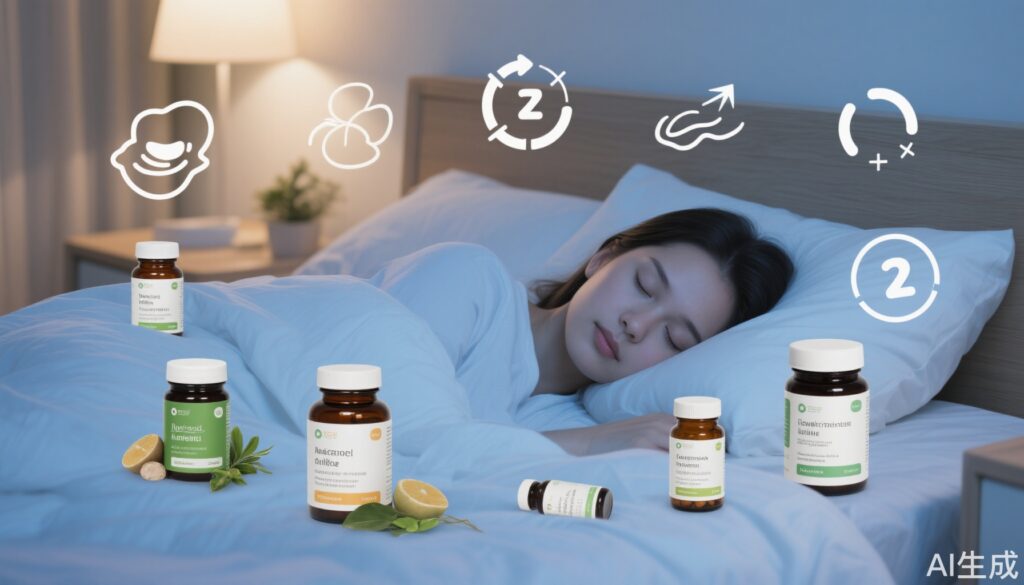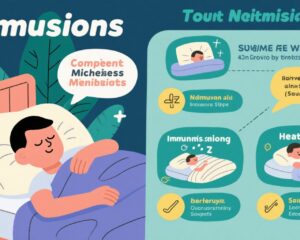Sleep is an essential pillar of health that influences physical, mental, and emotional well-being. Yet, millions worldwide struggle with sleep difficulties, ranging from trouble falling asleep to poor sleep quality and disrupted circadian rhythms. While lifestyle modifications remain fundamental, many seek additional help through dietary supplements and natural agents aimed to improve sleep. This article explores some of the most widely used sleep-support supplements: melatonin, jujube seed extract, gamma-aminobutyric acid (GABA), reishi spore powder, valerian root extract, ashwagandha, and magnesium. We discuss their mechanisms, scientific evidence, safety profiles, and practical guidance for usage.
Why Sleep Supplements Matter
Sleep disorders affect up to one-third of the global population at various points in life. Insomnia, irregular sleep-wake schedules (e.g., shift work or jet lag), and anxiety-related sleep interruptions contribute to significant health burdens including fatigue, impaired cognition, mood disorders, cardiovascular risk, and metabolic disruptions. Although prescription medications offer efficacy, concerns about dependency, side effects, and tolerance fuel interest in safer, natural-based alternatives. Supplements that support brain neurotransmission, endocrine rhythms, or autonomic nervous system balance may offer safe adjunctive strategies for improving sleep duration and quality.
Understanding Common Sleep Supplements
1. Melatonin: The Master Clock Hormone
Melatonin is a hormone secreted by the pineal gland primarily in response to darkness, orchestrating circadian rhythms and signaling the body to prepare for sleep. Levels naturally decline with age, often contributing to delayed sleep onset in older adults. Supplementing melatonin can reduce the time it takes to fall asleep, helpful especially for jet lag, shift work, or delayed sleep phase syndromes. However, excessively high doses may blunt endogenous production, so short-term, low-dose use is advised. Clinical studies support melatonin’s role in managing insomnia and circadian rhythm-related disorders with a favorable safety profile when used responsibly.
2. Jujube Seed Extract (Ziziphus spinosa)
Traditionally used in Chinese medicine for its calming and hypnotic effects, jujube seed extract contains saponins and flavonoids that suppress central nervous system overactivity, prolonging deep sleep stages. This makes it particularly beneficial for people whose sleep is disturbed by stress or anxiety causing light and fragmented sleep. Long-term use appears safe, though concurrent use with sedatives should be avoided to prevent additive effects. Emerging clinical trials are validating its sleep-enhancing potential.
3. Gamma-Aminobutyric Acid (GABA)
GABA is a primary inhibitory neurotransmitter in the brain that counters excitatory signaling, fostering a calming effect and reducing anxiety. Deficiency or altered GABA activity is linked to difficulties initiating and maintaining sleep. Oral GABA supplementation can improve sleep quality and reduce latency, though it has limited bioavailability and effects may vary. Care is warranted with concomitant antihypertensive therapy due to potential drug interactions.
4. Reishi Spore Powder (Ganoderma lucidum)
Reishi mushrooms have a long history of use in traditional Asian medicine for immune modulation and calming properties. The spore powder contains polysaccharides and triterpenoids that influence autonomic nervous system balance, reduce fatigue, and prolong slow-wave (deep) sleep phases. It is suited for individuals with weakened constitution or menopausal symptoms but requires prolonged use (weeks to months) for benefits to manifest fully.
5. Valerian Root Extract
Valerian root is known for its sedative and anxiolytic properties, primarily mediated by valepotriates and other active compounds enhancing GABA receptor responsiveness. It alters the transport and release of GABA, dampens sympathetic nervous system activity, and helps relieve depression and anxiety symptoms. Particularly effective for mild insomnia, valerian’s onset is gradual, often requiring 2 to 4 weeks of consistent use. Mild gastrointestinal discomfort may occur, so dosing after meals is recommended.
6. Ashwagandha (Withania somnifera)
Popularly called the King of Ayurvedic herbs, Ashwagandha is recognized for stress relief, sedative effects, and augmenting sleep architecture. Its extract contains triethylene glycol, which promotes non-rapid eye movement (NREM) sleep phases, improving overall sleep quality. Additionally, it enhances signaling at GABA A receptors. While generally safe, excessive intake may disrupt hormone homeostasis, potentially affecting thyroid function and metabolism. Careful dosing and medical consultation are advised.
7. Magnesium
Magnesium is an essential mineral that plays a key role in muscle relaxation and neuromuscular function. Adequate magnesium intake supports reduction in muscle tension and promotes a calm nervous system state conducive to sleep. Magnesium supplements have shown benefit in improving sleep quality, particularly in older adults and those with magnesium deficiency. Excessive intake, however, may lead to gastrointestinal issues such as diarrhea.
Common Misconceptions and Safety Considerations
Despite the popularity of sleep supplements, misunderstandings persist. Some believe natural supplements are completely without side effects—a notion that can be misleading. Benefits often depend on appropriate dosing, quality manufacturing, and individual variability in response. Supplements can interact adversely with prescription drugs, especially sedatives, antihypertensives, or hormone therapies. Overreliance without addressing lifestyle or underlying conditions may delay necessary medical evaluation. Persistent sleep problems exceeding one month or accompanied by daytime dysfunction warrant professional medical attention.
Practical Guidance for Safe Use
– Consult healthcare professionals before starting any supplement, especially if taking other medications or having chronic health issues.
– Start with the lowest effective dose to monitor tolerance.
– Avoid combining multiple sedative substances which may potentiate excessive drowsiness.
– Consider the timing of supplement intake to maximize circadian benefits.
– Maintain basic sleep hygiene: regulate light exposure, limit stimulants, sustain regular sleep schedules, and minimize stress.
Expert Insights
Sleep medicine specialists emphasize that supplements can serve as helpful adjuncts but do not replace fundamental behavioral and psychological interventions. Dr. Emily Richards, a sleep researcher, notes: “Supplements like melatonin and valerian root have their place in sleep management, especially for circadian rhythm disorders and mild insomnia, but sustained improvement requires holistic approaches including cognitive behavioral therapy and lifestyle adjustments.”
Patient Scenario: John’s Journey to Better Sleep
John, a 45-year-old software engineer, experienced difficulty falling asleep due to stress and irregular work hours. After consulting his physician, he started melatonin at a low dose for jet lag-related sleep disturbances and added magnesium supplements to relax his muscles. He also incorporated valerian root extract for anxiety-related light sleep. Over several weeks, John noticed improved sleep onset and less nighttime awakenings. He continued to practice consistent sleep hygiene and consulted his doctor regularly to monitor progress.
Conclusion
Multiple natural supplements offer promising options for improving sleep quality and duration, particularly for mild to moderate disturbances related to stress, aging, or circadian disruptions. Melatonin, jujube seed extract, GABA, reishi spore powder, valerian root, ashwagandha, and magnesium each act through unique but complementary mechanisms within the nervous and endocrine systems. While generally safe when used appropriately, individual responses and potential interactions underscore the need for professional guidance. Integrating supplements with lifestyle changes and appropriate medical care yields the best outcomes in achieving restorative sleep.
References
1. Ferracioli-Oda E, Qawasmi A, Bloch MH. Meta-analysis: melatonin for the treatment of primary sleep disorders. PLoS One. 2013;8(5):e63773.
2. Zhang ZJ, et al. Effect of Suanzaoren decoction on sleep quality: A systematic review and meta-analysis of randomized controlled trials. Sleep Med. 2019;56:149-158.
3. Abdou AM, et al. GABAergic system and sleep induction: a review. J Adv Pharm Technol Res. 2016;7(2):121-128.
4. Wachtel-Galor S, et al. Ganoderma lucidum (‘Lingzhi’); Biotechnology and Therapeutic Applications. Encyclopedia of Life Support Systems. 2012.
5. Bent S, et al. Valerian for sleep: a systematic review and meta-analysis. Am J Med. 2006;119(12):1005-1012.
6. Lopresti AL, Drummond PD. Efficacy of Ashwagandha (Withania somnifera) in Stress and Sleep Disorders: A Systematic Review. J Altern Complement Med. 2021;27(5):351-361.
7. Abbasi B, et al. The effect of magnesium supplementation on primary insomnia in elderly: A double-blind placebo-controlled clinical trial. J Res Med Sci. 2012;17(12):1161-1169.



